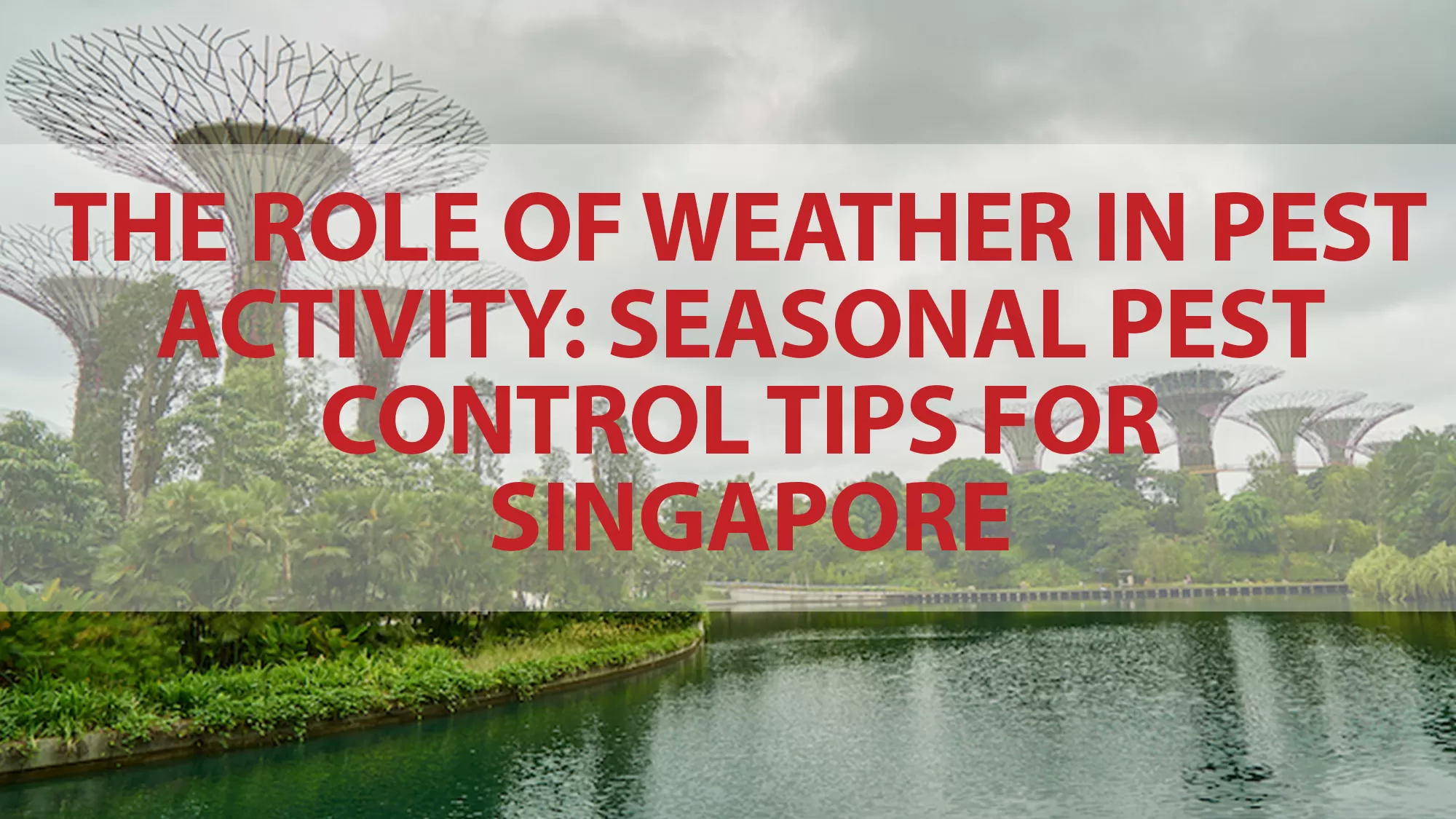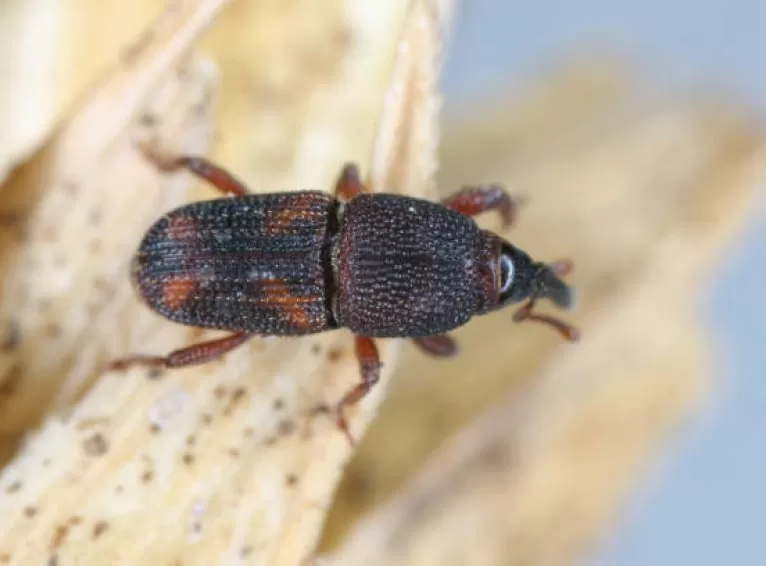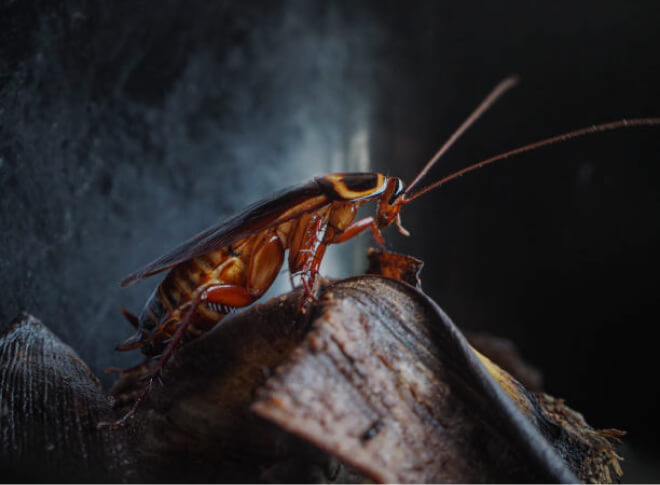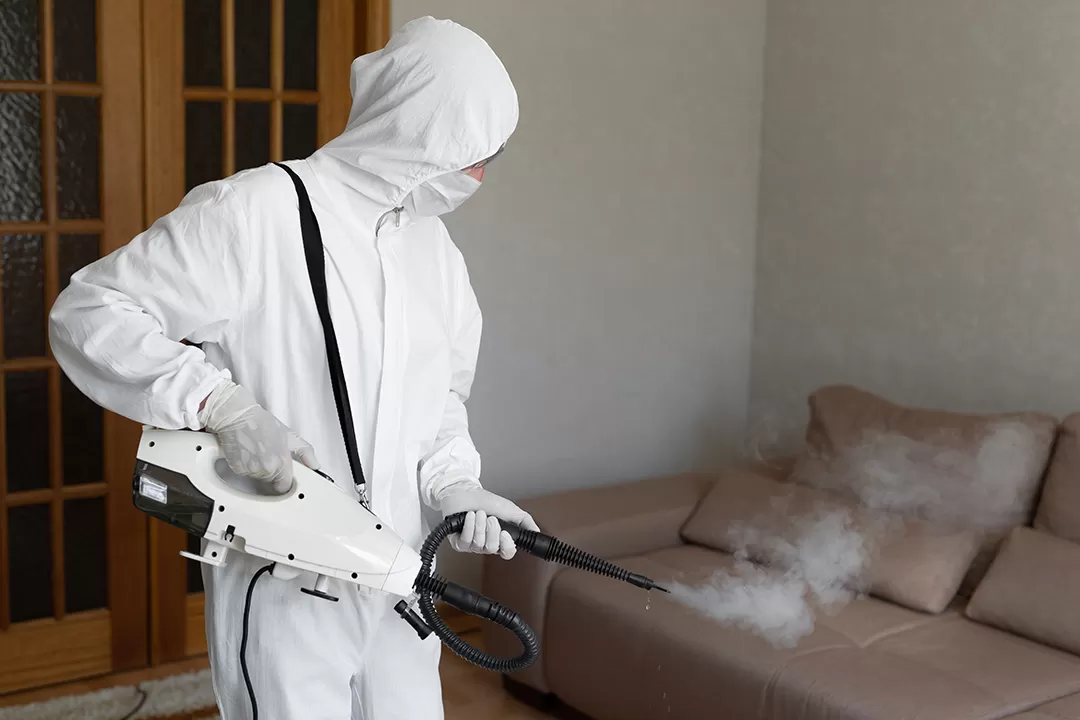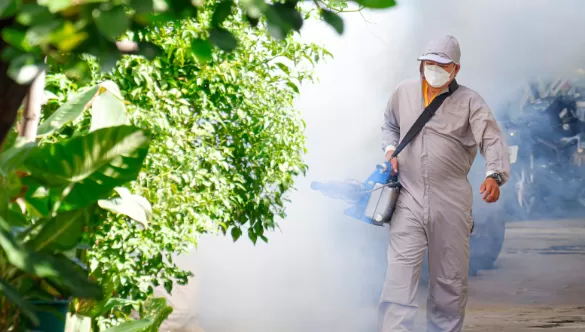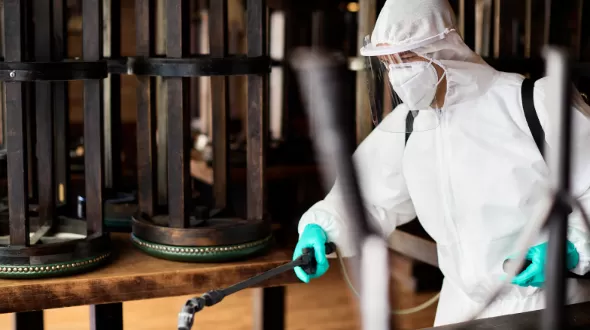The changing seasons bring about a multitude of transformations in our environment, affecting not only the landscape but also the pest activity. Weather plays a crucial role in determining the prevalence and behaviour of pests, making it essential for homeowners to adapt their pest control strategies accordingly. In this blog, we will explore the dynamic relationship between weather and pest activity, offering seasonal pest control tips to help you safeguard your home throughout the year.
How is Singapore’s Weather Favourable for Pests?
Singapore’s tropical climate, characterised by consistent warmth and high humidity levels, provides an ideal environment for the proliferation of various pests. The year-round favourable weather conditions create an ecosystem where pests can thrive and reproduce rapidly. The warm temperatures support the metabolic activities of insects, while the high humidity contributes to the availability of moisture, essential for their survival.
The abundance of rainfall during monsoon seasons creates stagnant water, becoming a breeding ground for mosquitoes. This, coupled with the constant warmth, allows mosquitoes to thrive and poses a continuous challenge for effective mosquito control. Additionally, the humid conditions provide an inviting habitat for pests like termites, which can cause structural damage to buildings as they seek shelter in the damp soil.
The lush greenery and well-maintained gardens in Singapore, although aesthetically pleasing, can attract pests seeking food sources and shelter. The city’s commitment to green spaces contributes to the prevalence of pests such as ants, cockroaches, and rodents, finding ample resources in close proximity to residential areas.
In summary, Singapore’s weather, characterised by high temperatures and humidity, creates a conducive environment for pests to flourish. Residents must adopt proactive pest control measures, especially given the year-round nature of pest activity in this tropical climate.
Seasonal Pest Control Tips for Pest Activity in Singapore
Year-Round Vigilance:
Regular Inspections:
Pests active year-round in Singapore include cockroaches, ants, and spiders. Cockroaches, attracted to warmth and moisture, often find shelter in kitchens and bathrooms. Ants, seeking food sources, may exploit small cracks and gaps in your home. Spiders, adaptable to various climates, can be found in corners, ceilings, and dark spaces. Additionally, rodents such as rats may be active year-round, particularly in urban areas, making thorough inspections crucial for early detection.
Proper Waste Management:
Poor waste management can attract pests such as rats, flies, and cockroaches. Rats are drawn to food waste, while flies and cockroaches thrive on organic matter. These pests can breed rapidly, posing health risks and making waste disposal an essential part of year-round pest control. Regularly clean outdoor bins, secure lids tightly, and dispose of garbage promptly to minimise pest attraction.
Drainage Maintenance:
Stagnant water provides an ideal breeding ground for mosquitoes, making them a year-round concern. Mosquitoes carry diseases like dengue and malaria, and their breeding sites often include clogged gutters and poorly drained areas. Regularly inspect and maintain your property’s drainage to prevent mosquito infestations. Additionally, termites can thrive in damp environments, emphasising the importance of drainage maintenance to deter both flying and subterranean termites.
Indoor Rodent Control:
In Singapore’s urban areas, rodents like rats may remain active throughout the year, posing a persistent challenge for homeowners. Beyond structural damage, rats can carry diseases and contaminate food supplies. Regular indoor inspections, especially in hidden or less frequented areas, can help identify early signs of rodent activity. Seal entry points and consider the placement of traps in strategic locations.
Outdoor Pest Threats:
Beyond the walls of your home, outdoor spaces and gardens can harbour pests like mosquitoes, ants, and rodents. Ant nests may form in garden areas, while mosquitoes breed in outdoor containers and flower pot saucers. Conducting regular inspections of your outdoor spaces and applying appropriate pest control measures can help mitigate the risk of infestations spreading from outside to inside.
Integrated Pest Management (IPM):
Year-round vigilance calls for a comprehensive approach, embracing Integrated Pest Management (IPM). This involves a combination of preventive measures, regular inspections, and targeted treatments. IPM focuses on minimising the use of pesticides and emphasises sustainable, environmentally friendly solutions. Implementing IPM ensures a holistic and long-term strategy for pest control, considering both the interior and exterior of your property.
Pest-Proofing Techniques:
As part of regular inspections for pest activity, invest in pest-proofing techniques to fortify your home against unwanted invaders. This may include installing door sweeps, repairing damaged screens, and sealing gaps around windows and doors. By creating a physical barrier, you can significantly reduce the likelihood of pests finding entry points into your living spaces.
Year-round vigilance against pests in Singapore demands a multi-faceted approach. Regular inspections, proper waste management, drainage maintenance, and additional measures tailored to specific pest threats ensure a resilient defence against the challenges posed by the tropical climate. By adopting a proactive stance and staying informed, homeowners can create a pest-resistant environment, promoting a healthier and more comfortable living space.
Monsoon Season Challenges:
Mosquito Control:
During monsoon seasons, mosquito populations surge due to increased rain, creating breeding grounds. Common species, such as the Aedes mosquitoes, can transmit diseases like dengue fever. Clearing clogged gutters, emptying containers that collect rainwater, and using mosquito nets are crucial preventive measures. Installing mosquito screens on windows and doors further reduces the risk of mosquito-borne diseases.
Termite Vigilance:
Heavy rain during monsoons can drive termites deeper into the soil, making them harder to detect. Subterranean termites are common in Singapore, and signs of infestation include mud tubes along walls and structures. Professional termite inspections and timely treatments are essential to curb potential damage. Additionally, during monsoons, other pests like snails and slugs may become more prevalent, impacting gardens and outdoor spaces.
Seal Entry Points:
Ants and other pests may seek shelter indoors during heavy rains. Ants, in particular, may invade homes through cracks and gaps. Sealing entry points is crucial to preventing infestations. Regularly inspect and repair windows, doors, and other potential entryways. It’s essential to address both indoor and outdoor entry points to create a comprehensive barrier against invading pests.
Hot and Dry Spells:
Ant Prevention:
Ants may enter homes in search of water during dry spells. Common species like the Singapore ant are resilient and adaptable. Fixing leaks promptly and keeping living spaces dry can deter ant invasions. Store food in airtight containers to eliminate potential food sources, helping in ant management. Additionally, during dry spells, pests like spiders and lizards may seek shelter indoors, emphasising the need for comprehensive pest control measures.
Regular Pest Control Services:
Extreme weather conditions, like intense heat, can drive pests indoors to seek shelter. Periodic professional pest control services help address potential infestations before they escalate. This preventive approach is especially important during weather extremes, ensuring your home remains a pest-free zone. Pest control professionals can assess the unique challenges posed by the weather and implement targeted solutions.
Maintain Greenery:
Insects and pests may use branches and foliage as entry points, especially during dry spells. Trimming vegetation around your property minimises contact with your home, reducing the likelihood of pests finding entryways. Regular landscaping maintenance is key to keeping pests at bay. Additionally, during dry spells, birds and rodents may be drawn to well-maintained gardens, so ensuring proper pest control measures extends beyond the structural aspects of your home.
Conclusion: Navigating Singapore’s Pest Landscape
In conclusion, the year-round vigilance required to manage pests in Singapore’s tropical climate necessitates a proactive and comprehensive approach. Regular inspections for pest activity, proper waste management, drainage maintenance, and pest-proofing techniques are essential components of an effective pest control strategy. Understanding the unique challenges posed by different pests during each season enhances your ability to anticipate and address potential infestations.
Engaging a professional pest control company is a strategic decision that can significantly enhance your pest management efforts. Pest control professionals bring expertise and experience, offering tailored solutions for the diverse pest threats presented by Singapore’s weather.
By partnering with a pest control company, homeowners can ensure a proactive and expertly managed defence against pests throughout the seasons. This collaborative approach not only provides peace of mind but also contributes to a healthier and more pest-resistant living environment in the dynamic climate of Singapore. Stay vigilant, stay informed, and let your home be a sanctuary in the midst of Singapore’s vibrant, tropical ecosystem.

